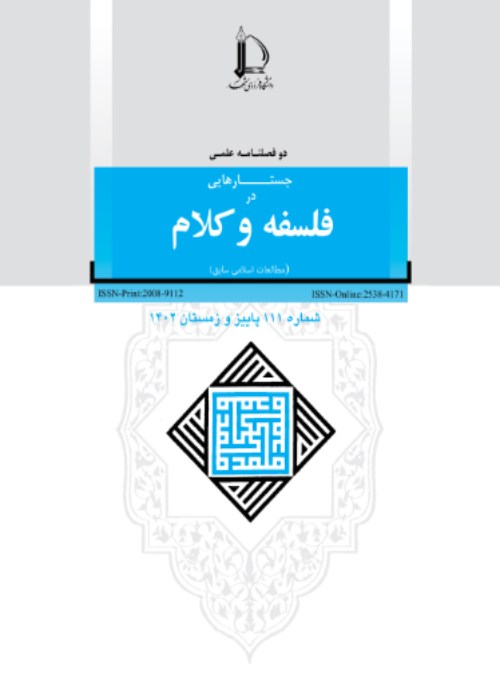The Nature of Ṣirāṭ (path) and the Reason for its Oneness in Allama Tabataba’i’s Philosophical-Theological Reading
Author(s):
Article Type:
Research/Original Article (دارای رتبه معتبر)
Abstract:
The “unity of Ṣirāṭ (path)”, whether being viewed through an intra-religious approach or an extra-religious one, is one of the requirements for the purity of Islam. Any interpretation or explanation that leads to the multiplicity of paths is logically in conflict with the purity of religion and the possibility of distinguishing right from wrong, and leads to absurdity. The present paper is a study with an affirmative approach to the “unity of the path” from the perspective of Allama Tabataba’i. After stating the problem, first the definition of the ontological, legislative and penal path from Allama’s point of view is presented and then his arguments on the unity of the path are explained. The result is that, with two philosophical reasons and three theological arguments, he has proved the unity of the path in its all three realms of creation, legislation and punishment, and consequently, has rejected the multiplicity of the path from the perspective of reason and religion. Philosophical reasons are: 1. the Simple Reality is everything (theology); 2. unity of efficient causes and final causes; and theological reasons are: 1. conformity of legislation and creation (cosmology); 2. the unity of the specific truth of human being (anthropology); 3. the rational implication between the oneness of the Almighty Lord with the unity of the path.The "unity of sirat", both inter-religious and extra-religious, is one of the purest elements of the Islamic religion. Any interpretation or conception that leads to a plurality of righteousness is logically at odds with the purity of religion and the possibility of distinguishing between right and wrong and leads to Backward argument.The present study is an exploration of the positive approach to the "unity of righteousness" from the view point of Tabatabai.After proposing the subject, first the definition of formative, anatomical and peculiar terms is presented from Allama's view point and then the Allameh's argument on the unity of will is explained. The result is that he has two philosophical reasons: (1) the very existence of the whole being (theology); (2) the unity of the causal and the ultimate causes; and (3) theological reasons (1) the conformity of the anatomy and the (cosmology); 3) Intellectual Implications of the Unity of the Supreme Rabbi with the Unity of the Sacrament The unity of the savior in all three domains of evolution has been proved, explicated, and punished, and consequently, the plurality of the saint has been rejected from the standpoint of reason and religion.
Keywords:
Language:
Persian
Published:
Islamic Philosophy & Theology, Volume:52 Issue: 2, 2022
Pages:
215 to 235
magiran.com/p2436757
دانلود و مطالعه متن این مقاله با یکی از روشهای زیر امکان پذیر است:
اشتراک شخصی
با عضویت و پرداخت آنلاین حق اشتراک یکساله به مبلغ 1,390,000ريال میتوانید 70 عنوان مطلب دانلود کنید!
اشتراک سازمانی
به کتابخانه دانشگاه یا محل کار خود پیشنهاد کنید تا اشتراک سازمانی این پایگاه را برای دسترسی نامحدود همه کاربران به متن مطالب تهیه نمایند!
توجه!
- حق عضویت دریافتی صرف حمایت از نشریات عضو و نگهداری، تکمیل و توسعه مگیران میشود.
- پرداخت حق اشتراک و دانلود مقالات اجازه بازنشر آن در سایر رسانههای چاپی و دیجیتال را به کاربر نمیدهد.
In order to view content subscription is required
Personal subscription
Subscribe magiran.com for 70 € euros via PayPal and download 70 articles during a year.
Organization subscription
Please contact us to subscribe your university or library for unlimited access!


